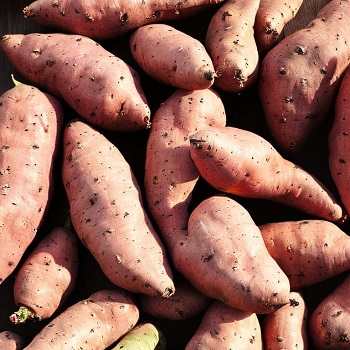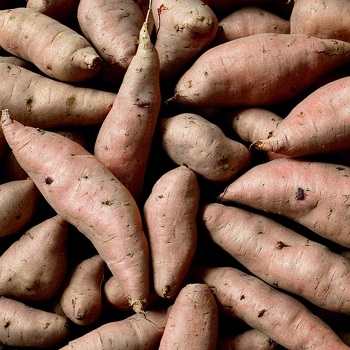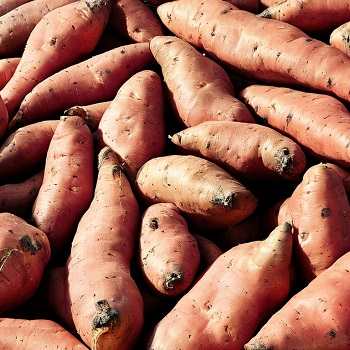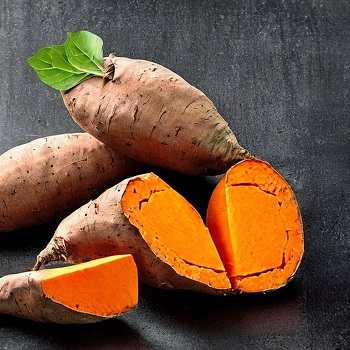People have long been confused by the debate over “Is a Sweet Potato a Vegetable or a Fruit?”. While some could argue that it qualifies as a fruit because of its sweetness, others say that it belongs solidly in the vegetable category because of its starchy texture. How should a sweet potato be classified, then? lets find out.
Is a Sweet Potato a Vegetable or a Fruit?
Sweet potatoes are classified as vegetables from a botanical standpoint. They are a dicotyledonous plant species and are members of the family Convolvulaceae. Vegetables are often perceived as savory or utilized in savory recipes, while fruits are generally linked with being sweet and possessing seeds.
What is popularly known as a yam in the United States is really a sweet potato. On the other hand, true yams are starchy edible tubers that come from a completely other plant family. Consequently, the misconception that sweet potatoes are yams spreads misunderstanding about their categorization.
The fact that sweet potatoes are also a carbohydrate adds to the complexity. They belong within the category of starchy root vegetables, along with other vegetables like potatoes. Sweet potatoes have more carbs than many other vegetables, even though most vegetables are not thought of as starchy.
In the end, the context and cultural interpretation may determine whether you consider sweet potatoes to be a fruit or a vegetable. They are undoubtedly vegetables when seen from a botanical standpoint. However, some people can mistake them for fruits owing to their sweet flavor and culinary application in both sweet and savory recipes.

Whatever category they fall under, sweet potatoes provide a variety of nutritional advantages. They are a fantastic supplement to a healthy diet since they are brimming with vital vitamins and minerals. They are adaptable components in a variety of cuisines because of their vivid color and inherent sweetness.
The carbohydrate level of potatoes, notably sweet potatoes, has drawn considerable criticism in recent years. It’s crucial to remember that sweet potatoes may still be a component of a healthy diet. For general health and wellbeing, moderation is critical, and including a range of fruits, vegetables, and other nutrient-rich meals is essential.
Why is sweet potato a vegetable?
Sweet potatoes are often classified as starchy root vegetables, the categorization of fruits and vegetables can be a bit more complex. Fruits typically have seeds, while vegetables usually not. In contrast to vegetables, which grow on the outside of plants, fruits originate from the reproductive components of plants, such as flowers or other fruits. This distinction explains why sweet potatoes are classified as a vegetable rather than a fruit, along with other tuberous vegetables like normal potatoes, carrots, and beets.
What is Difference Between A Fruit And A Vegetable?

What is a fruit, exactly? A fruit is a flowering plant’s fleshy or dry, fully-ripened ovary that contains one or more seeds, according to botany. Although sweetness and bright tastes are generally associated with fruits, their definition goes beyond taste. Botanically speaking, fruits include apricots, bananas, grapes, bean pods, maize grains, tomatoes, cucumbers, and even acorns and almonds (when still in their shells).
Vegetables, on the other hand, cover a wider variety of plant components. The word “vegetable” generally refers to the edible parts of plants that do not fall into the category of fruits or seeds. These consist of the stems, leaves, roots, and even some flower buds. Carrots, potatoes, lettuce, broccoli, and cauliflower are a few typical vegetables. The term “emergency” refers to a situation in which a person’s health is at stake.
Despite the precise distinctions provided by the botanical taxonomy, our daily perceptions of fruits and vegetables might vary depending to gastronomic and cultural viewpoints. Fruits are often seen as sweet or dessert-like in the culinary world; they are frequently eaten raw or added to pastries, smoothies, or jams. Vegetables, on the other hand, are often boiled, steamed, or roasted to bring out their characteristics and are typically linked with savory foods.
The amount of natural sugars in fruits, which give them their distinctive sweetness, is one aspect that influences perceptual variance. These sugars, which include fructose, sucrose, and glucose, have a satisfying flavor. Vegetables, in comparison, often have a reduced sugar content and a more neutral, sometimes bitter, flavor character.
Why are sweet potatoes healthy?

Yes, Sweet potatoes are healthy because its a source of vitamins A and C, both of which play crucial roles in supporting overall health. Maintaining healthy eyesight, bolstering the immune system, and encouraging healthy skin all depend on vitamin A. You may get 400% of your recommended daily allowance of vitamin A from just one sweet potato, which makes it a great option for preserving your immune system and eye health.
Contrarily, vitamin C works as a potent antioxidant in the body, assisting in the defense of cells against the harm that free radicals may cause. It also helps to produce collagen, which is necessary for strong connective tissues, joints, and healthy skin. You may enhance your consumption of vitamin C and give your body an additional boost of this crucial mineral by include sweet potatoes in your diet.
Sweet potatoes are full of essential vitamins and minerals in addition to vitamins A and C. They include vitamin B6, which is necessary for the growth and operation of the brain. The synthesis of neurotransmitters, which are in charge of transferring messages between nerve cells, is another essential function of vitamin B6. You may promote the health of your brain and nervous system by including sweet potatoes into your diet.
Additionally, sweet potatoes are a significant source of manganese, a mineral essential for a number of body processes. In the development of bones, metabolism, and collagen synthesis, manganese is important. Additionally, it functions as an antioxidant and aids in cellular protection. You can guarantee an appropriate intake of manganese and support these vital body functions by including sweet potatoes in your diet.
Sweet Potato vs Yam

Yams are not the same as sweet potatoes. Let’s start by looking at yams’ qualities. Yams differ from sweet potatoes in that their skin is rough, dark brown, and sometimes likened to tree bark. Their flesh resembles that of an ordinary potato in that it is starchy and dry. On the other hand, when cooked, sweet potatoes have smooth, crimson skin and softer meat. Sweet potatoes have a delicious sweetness to them, although yams are starchier and less sweet.
Their sizes are another obvious difference. Yams have the capacity to develop into considerably bigger plants than sweet potatoes. They may weigh more than 100 pounds and grow as long as seven feet. The huge size difference between these two vegetables accentuates their differences even further.
The phrases “yam” and “sweet potato” are often used synonymously in the United States, which has led to the mislabeling of both vegetables on cans and in other places. This misconception has contributed to consumer confusion.
It’s crucial to remember that real yams, which are members of the Dioscoreaceae family, are indigenous to Asia and Africa. In American normal supermarket shops, you hardly ever see these yams. Sweet potatoes, on the other hand, are a member of the Convolvulaceae family and are widely available in a variety of varieties.
Understanding the differences between yams and sweet potatoes requires being able to identify the various plant elements involved. While sweet potatoes are classified as roots, yams are considered tubers. The difference in their physical characteristics is a result of this divergence.
Yams often have a more cylindrical form with skin that is scaly and resembles bark. Their characteristic texture comes from the rough surface that resembles tree bark. In contrast, sweet potatoes often have smoother skin, more elongated shapes, and reddish-brown skin.
10 Amazing Health Benefits of Sweet Potatoes

Sweet potatoes are a very healthy root vegetable that have many health advantages. Sweet potatoes are a wonderful and adaptable complement to any diet since they are high in fiber, vitamins, and minerals. Here are the 10 Health Benefits of Sweet Potatoes :
1. increases immunity
Sweet potatoes’ exceptional capacity to strengthen immunity is only one of its many health advantages. These root vegetables are a great source of antioxidants, especially vitamin C, which is vital for boosting the immune system. You can assist your body fight off different diseases and infections by eating sweet potatoes.
2. increases digestive health
Dietary fiber, which is crucial for maintaining a healthy digestive tract, may be found in plenty in sweet potatoes. Sweet potatoes’ high fiber content aids in regulating bowel motions, avoids constipation, and promotes the development of good gut flora. Your digestive system may function more effectively and healthily if you consume sweet potatoes.
3. Enhances Eye Health
The beneficial effects of sweet potatoes on eye health are another noteworthy advantage. These root vegetables are a good source of beta-carotene, which is a vitamin A precursor. Particularly in low light, vitamin A is essential for keeping excellent eyesight. Consuming sweet potatoes often may assist to safeguard your eyes and encourage ideal eye health.
4. Properties that Reduce Inflammation
The anti-inflammatory qualities of sweet potatoes are potent and may help decrease inflammation in the body. Heart disease, diabetes, and several forms of cancer have all been associated with chronic inflammation. Together, the antioxidants and phytochemicals in sweet potatoes reduce inflammation and advance general health.
5. Aid in heart health
For general wellbeing, it’s essential to maintain a healthy heart, and sweet potatoes may help you do this. Potassium, a mineral that aids in controlling blood pressure levels, is abundant in several root vegetables. A balanced diet that includes sweet potatoes may help maintain a healthy heart and lower the chance of developing heart disease.
6. Encourages Weight Management
Sweet potatoes might be a beneficial addition to your diet if you’re trying to keep your weight under control or shed it. They provide a significant quantity of nutritional fiber and just a few calories. As a result of the fiber in sweet potatoes, you will feel fuller for longer and be less likely to overeat. In addition, sweet potatoes’ complex carbs provide you long-lasting energy and may help you lead an active lifestyle.
7. Delivers Vital Nutrients
Vitamins and minerals that are necessary for optimum health are abundant in sweet potatoes. They are a fantastic source of vitamins A, C, and B6. Additionally, they include minerals including manganese, magnesium, and potassium. You can make sure you’re receiving a variety of essential nutrients to support your body’s processes by include sweet potatoes in your meals.
8. Potentially Cancer-Preventive
According to certain research, sweet potatoes may be able to combat cancer. Sweet potatoes include antioxidants and phytochemicals that have been demonstrated to slow the development of certain cancer cells and lower the chance of getting some cancers. To completely comprehend the magnitude of sweet potatoes’ anti-cancer benefits, additional study is necessary.
9. Aid in Brain Health
Antioxidants and vitamins found in sweet potatoes may help to support healthy brain function. These substances aid in preventing oxidative stress and inflammatory damage to brain tissue. You may be able to increase cognitive performance and lower the risk of age-related cognitive decline by include sweet potatoes in your diet.
10. Delicious and Flexible
In addition to their many health advantages, sweet potatoes are also tasty and highly adaptable. From savory to sweet foods, you may include them. Sweet potatoes give a delicious taste and texture to any dish, whether you like them baked, mashed, roasted, or in soups and stews.
The Healthiest Potatoes to Include in Your Diet
1. Red Desiree Potatoes: The Nutrient Powerhouses
The Red Potato family’s Red Desiree potatoes have established themselves as the healthiest type of potatoes on the market. A variety of necessary vitamins, minerals, and healthy phytochemicals are abundant in these bright tubers. Red Desiree Potatoes stand out as the nutritional leaders when compared to other varieties of potatoes.
2. Sweet Potatoes: A Nourishing Alternative
The term “soap” refers to a product that is used to describe a product. They contain a little bit more calories, but they are also abundant in fiber, vitamins, and minerals. Sweet potatoes have a striking orange hue because beta carotene, which the body turns into vitamin A, is present. This vitamin is crucial for sustaining overall wellbeing, fostering strong immunity, and preserving healthy eyesight.
It’s interesting that blue or purple-fleshed sweet potatoes have been shown to be very healthy. These kinds include greater concentrations of antioxidants, which are essential for lowering the risk of chronic illnesses and oxidative stress.
3. Purple Potatoes: A Colorful Superfood
Due to their outstanding nutritional profile, purple-fleshed potatoes are often praised as superfoods. Anthocyanins, a kind of antioxidant pigment with well-known health advantages, are responsible for the vivid colour. Due to their abundance in vitamins, minerals, and antioxidants, purple potatoes are a wonderful complement to any balanced diet.
Anthocyanins have been linked to a lower risk of heart disease, better brain health, and better eye health. They also have anti-inflammatory qualities, which add to the overall health benefits they provide.
4. Russet Potatoes: A Fiber Boost
Russet potatoes have their own set of health advantages despite not being as visually appealing as their purple or red relatives. Compared to white potatoes, these potatoes have more fiber, which might help with digestion and increase sensation of fullness. You may control your weight and keep a healthy gut by using russet potatoes in your meals.
Fiber is essential for maintaining a healthy circulatory system, controlling blood sugar levels, and lowering cholesterol. Russet potatoes are a great way to increase your fiber intake while still savoring the hearty tastes of classic potato meals.
5. Other Varieties: Exploring the Options
In addition to the aforementioned variations, there are many additional kinds of potatoes that are readily accessible, each with special attributes and health advantages. Like the tiny, high-potassium, high-vitamin C, and high-antioxidant fingerling potatoes. A high source of vitamin B6, vitamin C, and potassium are Yukon Gold potatoes, which are renowned for their buttery flavor.
It’s crucial to understand that all varieties of potatoes have health advantages. The term “noble” refers to a group of people who work together to solve problems.
In conclusion, sweet potatoes are classified as vegetables, more precisely, starchy root vegetables, according to scientific theory. However, depending on cultural and culinary interpretations, their designation as a fruit or a vegetable might change. Whatever category they fall under, sweet potatoes are a versatile food that have many health advantages. Therefore, there is no doubting their delicious flavor and nutritious benefits regardless of whether you choose to enjoy them as a fruit or a vegetable.
Related Posts:
16 Vegetables That Are Actually Fruits (Scientifically Proven)
Do Weeping Cherry Trees Produce Fruit? (Edible or Not Explained)
What Does Strawberry Tree Fruit Taste Like? (Information)
Are Green Beans Fruits or Vegetables? – Know Everything
Do Pygmy Date Palms Produce Fruit: Truth About Fruit Production?
Reference:
https://extension.usu.edu/nutrition/research/sweet-potatoes
https://www.hsph.harvard.edu/nutritionsource/food-features/sweet-potatoes/
https://hgic.clemson.edu/healthy-tips-sweet-potatoes/
https://reallifegoodfood.umn.edu/eat/fruits-and-veggies/fruits-vegetables-z/sweet-potato
